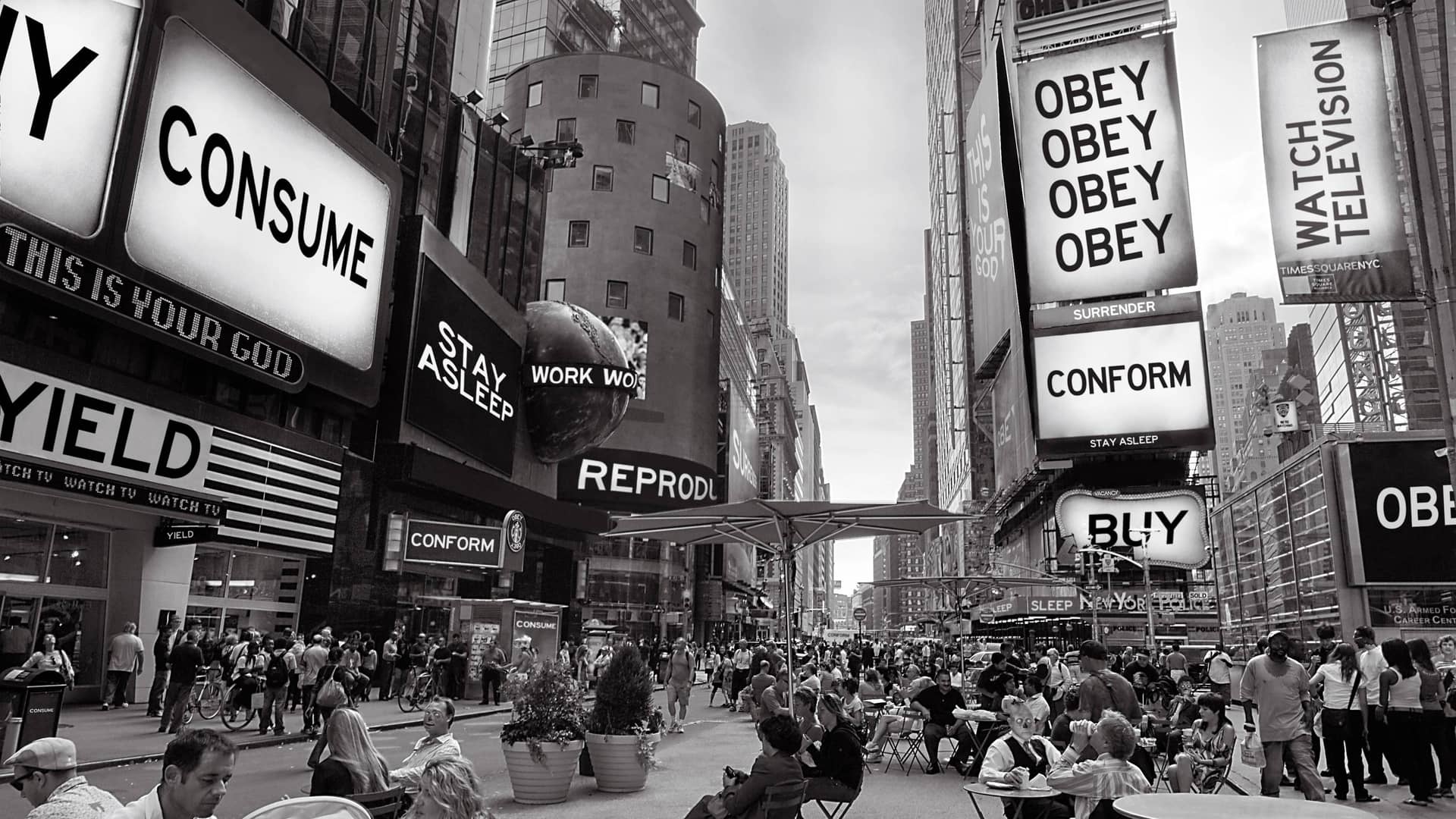In Wim Wenders’ documentary film Buena Vista Social Club about the music of Cuba we see some great old-Cuban musicians playing music and talk about their life. Aside their talent that grabs the viewer, what also impresses is how these people grew up with so few possessions, so destitute yet they are so joyous and optimistic.
“Is it perhaps frugality that makes a man happy?” I was thinking as I was watching the movie.
But when the Cuban musicians found themselves in New York for a gig, we see them becoming fascinated by the fronts of the stores, the abundance in the supermarkets, the cars, the buildings.
Their eyes glint at the prospect of being a part in the heaven of consumerism. They were leading a good life when their consuming options were limited – and their survival secured. But with money in their pockets, what else could they do, was anything better than consume?
~~
The consumer’s mentality (I consume, therefore I am) is a notion of the modern world.
Our ancestors, two generations before at the most, held frugality and saving as virtues. They were fixing their clothes and the furniture. The home appliances and the cars they were buying – those who could afford them – were meant to last for a lifetime. It was a sin to waste food, even a single morsel of bread.
Were they more miserable than us? No, but then again neither were they happier.
The thing is that capitalism and frugality don’t mix. The goal of every corporation is to maximize its profits and invest them in new products which will yield new profits.
The corporations produce constantly new products; and someone has to buy them.
If all the people around the globe refrained from shopping for a month, tops, they would debilitate the economy more than all strikes and revolutions combined.
In fact, if nobody bought anything for a week, the global economy would collapse.
But people can’t stop buying. Shopping is as gratifying for the human brain as no other habit, mindset or ideology.
~~
Consider the popular religions and ideologies. How many Christians can be true Christians throughout their entire life – or even for a day? How many alternatives live in abandoned places, how many communists are content with their fair share of the products? It is hard to live like that and only a few people really live by the morals.
On the other hand, consumerism is something pleasant for everybody. Even if you are short of money, you can borrow from the bank or use your credit card to get what you “want”; especially if it is offered at a 50% discount. You will figure out later how you will cough up.
~~
The truth is we don’t need all these things we buy. But we are conditioned to believe that the items or services we want to obtain are things we really want.
The modern products are not designed to last for too long. But even if they remain in working order, we are informed that we need to replace them with the state-of-the-art model, with the brand-new software. Every year there is a new iPhone. Why should you keep the obsolete (a mere year before!) model?
The fashion in clothes is constantly changing. Those who can afford it will shop from eponymous labels no matter if the ones they bought a year before are still in pristine condition. Those who are not very well-off will resort to low-end chain stores for the trash (H&M, ZARA, etc) where the second-rate clothes fall apart not even lasting for a year, before the new discount period begins.
Discounts and special offers (consider Black Friday) make people act senselessly. You can do without an ice cream maker, but when it is up for grabs at half the price it is unlikely to pass it by.
All the ex religious holidays are connected with orgies of spending. Christmas is the synonym of extravagance – and the boost for the slumped market. Newfangled celebrations, like Valentine’s Day, or even national celebrations, summer holidays, every bank holiday and day-off mean nothing unless we can consume.
~~
When it comes to food, the thrill we get by consuming is absolute. Right now there is more money spent on diets than solving the problem of world hunger.
This is the apotheosis, the biggest win of consumerism: not only do we eat more than we can, not only do we waste more than we can eat, but on top of that we spend even more money on diets, low-fat food and gyms.
Why are we doing this? Why all the people around the world do so when they are given the chance?
Because we feel good when we buy, we feel fine when we obtain more.
~~
Consider the joy someone feels when they are given a gift. Even if they didn’t need it, even if they didn’t want it, even if it was not exactly what they desired (looking a gift horse in the mouth?), they think they have earned something.
It is an instinct to amass gifts. The children love presents and it is hard for them to share something they belong. You can teach them to do so, but it is not something pleasant for them.
‘Property is theft’ said Proudhon. In similar circles, you’ll hear theories about how much more complete are the people who share.
Christ too, so the scripts read, was urging his Jewish compatriots to give one cloak away if they had two. Mohammed didn’t go to such lengths by saying that every trader should donate a 10% of his profits to the poor.
Material wealth and whatever earthly carries no value in Buddhism. The more you free yourself from these, the closer you get to enlightenment. In Confucianism, a man’s greatest virtue is what they offer to society.
The contemporary new age philosophy (see Buscaglia) also focuses on your being, which is more important than having possessions.
All these ideologies give something in return for renouncing materials. In religions it is the afterlife (heavens and nirvanas), in political theories it is the utopia of the forthcoming heaven on earth.
All these people, communists and anarchists, Christians and Muslims, new agers and alternatives, convince considerably fewer than those that consumer’s mentality does which goes for something plainer: Buy as much as possible – especially when it is the discount period.
~~
Why not do it, if it keeps us happy? If consumption brings happiness, what’s the problem?
The first one is that we buy more than we can afford. The banks contribute to this by offering consumer loans and credit cards. But they don’t contribute when they ask the money –plus interest- back.
~~
The second problem is what we are doing to make money to buy all these things that make us happy.
Most of us have taxing jobs with low wages. As we live our life aimlessly, we need something to boost our spirits. One of the dopes, which is as addictive as the hard drugs, is consumption.
It is a vicious circle. The more miserable you feel your life is, the more you spend, and therefore you have to work harder to make the necessary money. But you are never able to buy everything you want.
~~
The third problem is that we don’t own the things we buy, instead they own us. Our addiction to our mobile phone, our computer, the pay TV, our car or shoes is beyond description.
Ask any man to live for a few days without these things: they will feel that their life makes no sense anymore. Emptiness.
Therefore, it seems that consumerism, namely the things/services we buy, has displaced religion, ideologies and human relationships.
We are not searching anymore for the meaning of life, for we have already found it: consuming.
~~~~~~~~~~~~~~~~~~~~~
The picture is from John Carpenter’s cult film They Live, 1988.
~~~~~~~~~~~~~









